#Govinda
Text
Something I find fascinating about the Critical Edition of the Mahābhārata is that the characters sporadically move from addressing Kṛṣṇa as an embodied mortal (as their friend, cousin, son-in-law etc) to addressing him as the Godhead; as Viṣṇu, as the Supreme Being, and as Īśvara. The succession of change between the modes of address can sometimes even happen on the same page, at a distance of a few lines. The veil is lifted, and the characters see through Kṛṣṇa’s illusion, and, through that, they become immersed in the nature of Reality; the veil promptly drops back, and God is lost. An argument for this could be that the divine modes of address are interpolations, a theory being that Kṛṣṇa became identified with Viṣṇu only in later renditions of the Mahābhārata. While this could be true at the level of historical analysis of the epic, for me, there is a subtler teaching encased here: how all of us, without exception, glimpse into the nature of Reality as we move through life, yet we perpetually proceed to return to becoming engrossed in the superimpositions we project upon Reality; and the dance continues. From Truth to dream, from dream to Truth. It is quite endearing, really. What committed and imaginative dreamers we are!
Adyashanti once talked about how one inadvertently glimpses truth; it is, after all, inescapable as it is our nature; the trick is not forgetting / losing the glimpse.
Gorgeous artwork of Kṛṣṇa: Awedict.
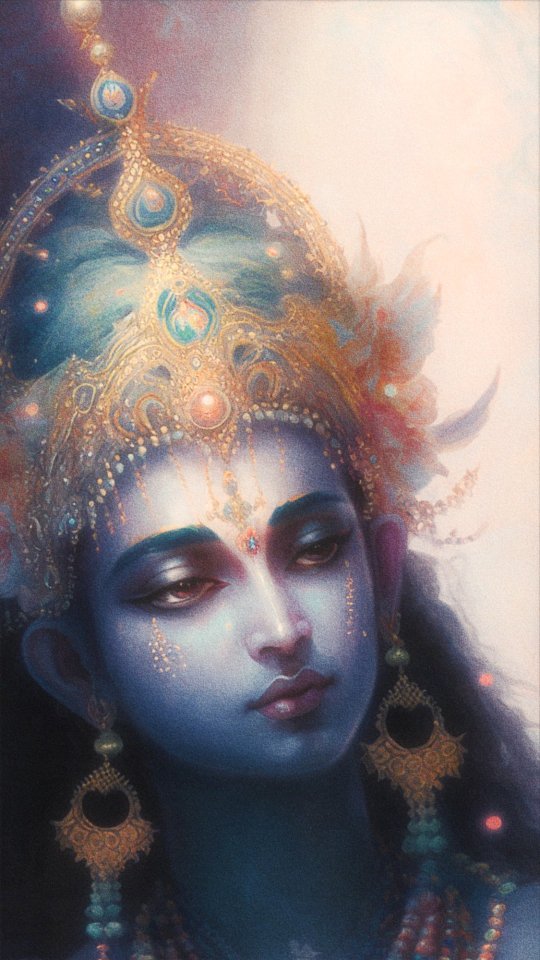

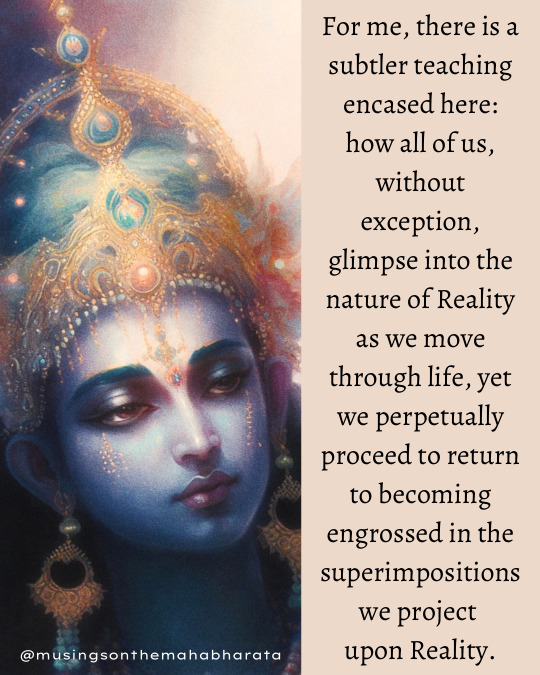

#mahabharata#krishna#mahabharat#mahabharatam#gopala#govinda#adyashanti#nonduality#non dualism#non duality#avatara#hare krishna#krishna consciousness#hinduism#hindu art#awedict#bhagavad gita#vishnu#ishvara#bhakti#hindu mythology#itihasa#sanskrit#hindu#gopal
120 notes
·
View notes
Text
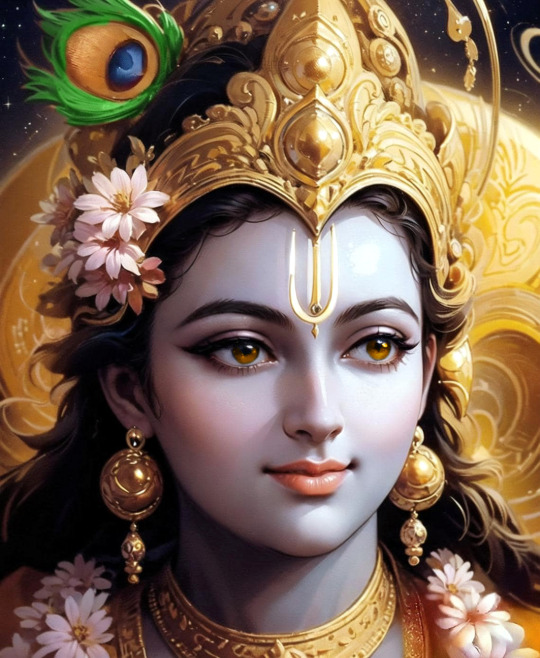
☀ SHRI KRISHNA GOVINDA ☀
Shri Krishna said:
“One who does not desire anything within this world, who has achieved peace by controlling his senses, whose consciousness is equal in all conditions and whose mind is completely satisfied in Me finds only happiness wherever he goes."~Srimad-Bhagavatam 11.14.13
92 notes
·
View notes
Text
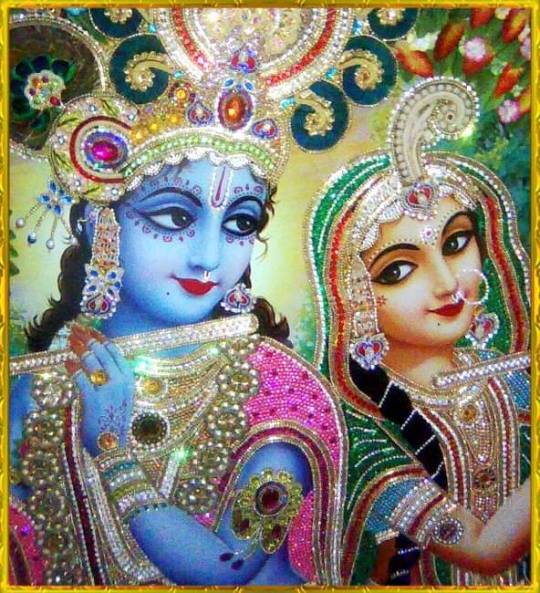
11 notes
·
View notes
Text

on the banks of Gaṅgā
you held me all night, my Lord
unseen to the eye,
your grace, a lover's touch, wrapped my skin
unheard to the ears,
your name, my japa, vibrated through my braincells
Monsoon One, do you long for me as fully as i long for you?
do you call on me as ardently as i call on you?
you do, don't you, my Lord?
i am not alone in this quest
for every step i take towards you,
you take two towards me
for every tear i spill in yearning for you,
you ignite vīrya in my skin tissue
for every test of yours that i fail,
you yank me freer of delusion
i see it now, Hari.
you have been pulling me
by my hair and hands to you.
it was all you. it was always all you.
if i run to you as fast as my legs can take me,
will you meet me halfway?
you will, won't you, my Lord?
🦚 Happy Kṛṣṇa Janmāṣṭamī! 🙏 poem from my upcoming collection "the Monsoon One and the pilgrim". 💛
photo: Rishikesh, October 2022.
#bhakti#bhakti poetry#krishna#govinda#gopala#haribol#hindu#hinduism#vaishnava#krishna janmashtami#krishna janmastami#hare krishna#ganga#ganges#rishikesh#india#bharat#sari#devotional poetry#krishna consciousness
39 notes
·
View notes
Text
▪︎ radhey radhey govinda, govinda radhey🙇🏻♀️🫀
#how much i love#listening to bhajans#on full volume#when no one's at home#bhakti#hindublr#radha krishna#govinda#bhajan
9 notes
·
View notes
Text

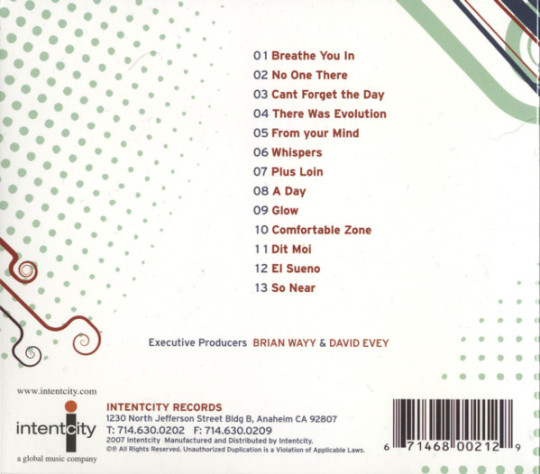

Govinda – Sound Sutras (2007)
#2007#2000s#07#00s#album art#album#album cover#cd#design#disc#electronic music#frutiger aero#frutiger metro#govinda#graphic design#illustration#music#scans
28 notes
·
View notes
Text
Lord Balaji (Venkateswara) Pooja
#balaji #hanuman #ram #jaishreeram #hindu #india #hanumanji #salasarbalaji #hinduism #bajrangbali #god #jaihanuman #lordhanuman #tirumala #govinda #sankatmochan #tirupati #jaisiyaram #tirupatibalaji #ramayan #krishna #lordram #jaihanumanji #harekrishna #hindustan
Know more about #Hinduism from here: https://bhagavanbhakthi.com/
#lord balaji#tirupati#tirumala#venkateswara#govinda#lord krishna#krishna#hare krishna#iskcon#vaishnava
8 notes
·
View notes
Text
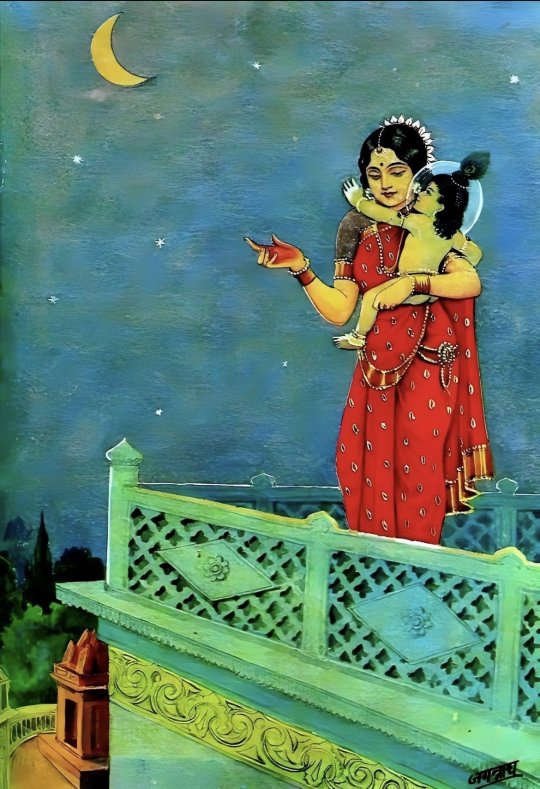
Hare Krishna Hare Krishna Krishna Krishna Hare Hare
Hare Rama Hare Rama Rama Rama Hare Hare
#krishna#radhakrishna#radharani#radheradhe#hare krishna#govinda#srila prabhupada#love#peace#hope#joy
8 notes
·
View notes
Text
youtube
Immerse yourself in divine devotion with "Shree Krishna Govinda Hare Murari" beautifully rendered by Rohmish. With soulful vocals by Rohmish and mesmerizing music arrangement by Jainil Amin, this rendition captures the essence of spiritual bliss. Join us in honoring the divine through this timeless Krishna bhajan originally composed by Ravinder Jain. Don't forget to check out the talented singer and musician Jainil Amin's YouTube channel for more amazing content.
#ShreeKrishna#Govinda#HareMurari#Bhajan#DevotionalMusic#DivineMusic#RohmishCover#JainilAmin#KrishnaDevotion#SpiritualBliss#RavinderJain#KrishnaSongs#SingerComposer#YouTubeCover#IndianMusic#BhaktiSongs#Youtube
2 notes
·
View notes
Text

@jaimeblancarte Querétaro, Qro. 2012
#photos#photographer#photography#fotos tumblr#fotos#mextagram#artists on tumblr#urbanphotography#tumblr mexico#govinda#chihuahueño#fantasy#queer community#mood photo#my pics#best picture#best tumblr#tumblr blog#liketolike#luz de ventana
14 notes
·
View notes
Text
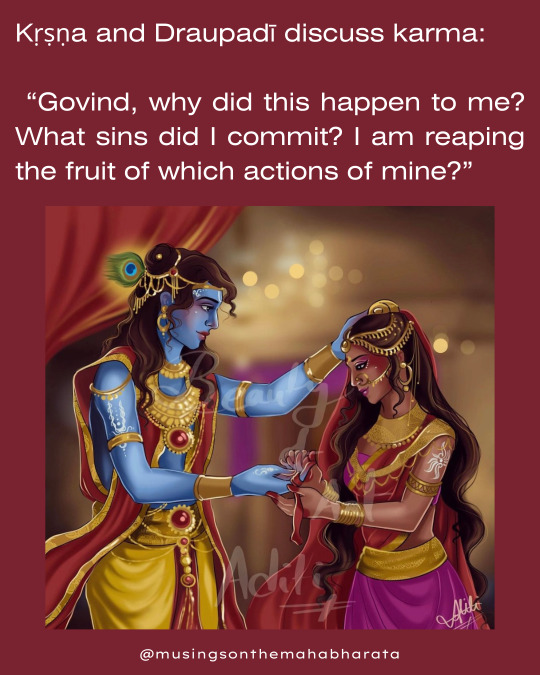
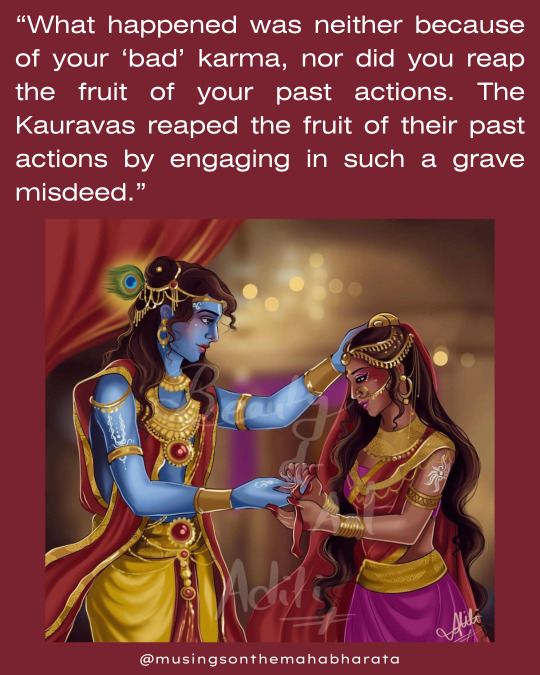
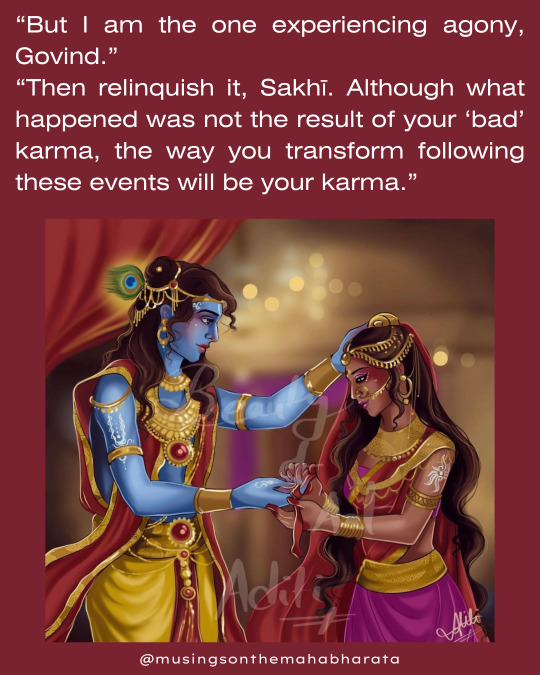
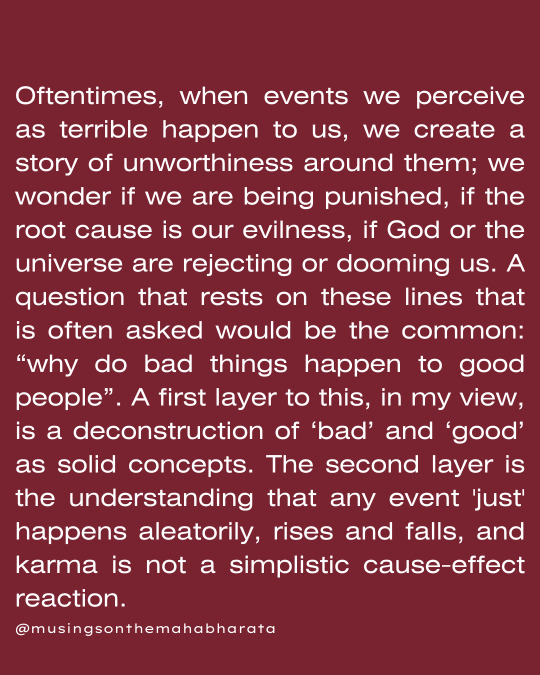
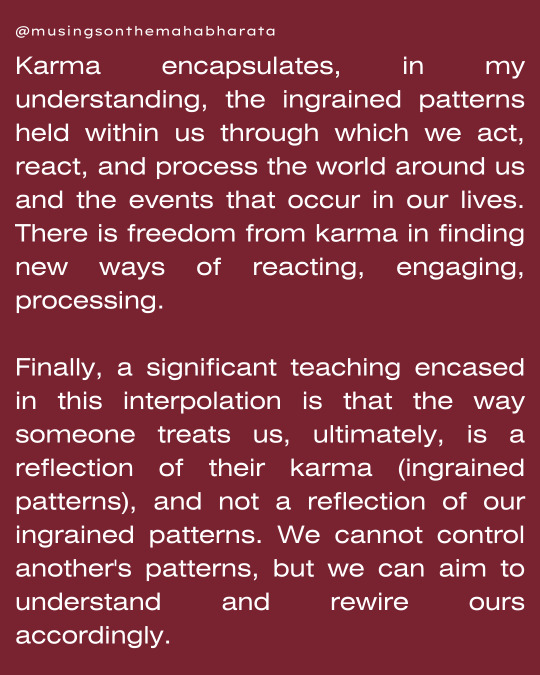
Kṛṣṇa and Draupadī Discuss Karma
One of my favourite interpolations from modern tellings of the Mahābhārata is a conversation between Draupadī and Kṛṣṇa that occurs after Draupadī's sexual assault and attempted disrobing by the Kauravas.
Clutching his feet, Draupadī sobs: "Govind, why? Why did this happen to me? What sins did I commit? I am reaping the fruit of which actions of mine?”
Picking her up and caressing her hair, Arya tells her: "What happened was neither because of your ‘bad’ karma, nor did you reap the fruit of your past actions. It was the Kauravas who reaped the fruit of their past actions by engaging in such a grave misdeed. Sakhī, this is the meaning of karma."
"But I am the one experiencing agony, Govind."
"Then relinquish it, Sakhī. Although what happened was not the result of your 'bad' karma, the way you transform following these events will be your karma."
This is such a beautiful and profound exchange which offers rich nuances to the teaching of karma. Oftentimes, when events we perceive as terrible happen to us, we create a story of unworthiness around them; we wonder if we are being punished, if the root cause is our evilness, if God or the universe are rejecting or dooming us. A question that rests on these lines that is often asked would be the common: “why do bad things happen to good people”. A first layer to this, in my view, is a deconstruction of 'bad' and 'good' as solid concepts. The second layer is the understanding that any event 'just' happens aleatorily, rises and falls, and karma is not a simplistic cause-effect reaction.
Karma encapsulates, in my understanding, the ingrained patterns held within us through which we act, react, and process the world around us and the events that occur in our lives. There is freedom from karma in finding new ways of reacting, engaging, processing.
Finally, a significant teaching encased in this interpolation is that the way someone treats us, ultimately, is a reflection of their karma (ingrained patterns), and not a reflection of our ingrained patterns. We cannot control another's patterns, but we can aim to understand and rewire ours accordingly.
The magnificent art: @beauty_of_art_aditi.
#mahabharata#mahabharat#krishna#draupadi#sakhi#sakha#govind#govinda#hare krishna#mahabharatam#itihasa#hinduism#hindu art#yajnaseni#panchali#mahabharat star plus#hindu#hindu mythology#karma#spirituality#shri#teaching#freedom#mahabharata art#raksha bandhan#religion#sanskrit
124 notes
·
View notes
Text
☀ SHRI KRISHNA GOVINDA ☀
66 notes
·
View notes
Text
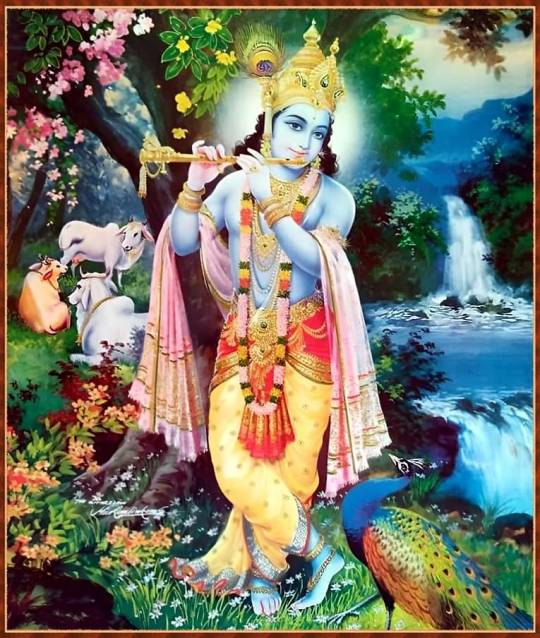
9 notes
·
View notes
Text
musings on the Mahābhārata series: introduction
The Mahābhārata is a love of my life, and one of my main research interests – as well as the subject matter of my upcoming PhD thesis! for awhile now, i have been reflecting on how to meaningfully share about the Mbh on my social media platforms. generally, i would say that there are two main approaches to the Mbh in contemporary discourse: one is the academic and scholarly approach, which, although i both adore and adhere to, i find to be largely inaccessible and limited to the academic niche. the second, which seeps more into contemporary discourse, i find to be a moralistic, religious outlook. although i consider both approaches to be valid and needed in society, i believe that what is missing is more intimate, personal sharing about the Mbh. i, for one, am not in love with the Mbh purely out of intellectual curiosity. for me, The Mahābhārata is alive; it exists within me and within the collective consciousness as a mirror to our own thought processes and individual universes. i would therefore like to challenge myself past my usual scholarly approach and share earnestly about what it means for me to immerse myself in this marvellous epic. for instance, what does it mean for me as a modern woman to read about Draupadī’s disrobing; how can i understand myself better through her character?
to ground these discussions more, i will create infographics about the plot, the historical context & main characters (created more out of love for the Mbh than for these discussions, to be honest!).
very excited for this and am looking forward to establishing myself further in the epic’s framework through this interactive approach!
to begin with,
WHY THE MAHĀBHĀRATA?
a question any scholar should ask themselves, i would argue, is why? why is my research relevant, why should i conduct this research in the first place, and how can it answer to questions of the present?
today, i am going to answer to this question with regards to the Mahābhārata. why should we care about an ancient epic poem? first of all, because the Mbh is not a dead, lifeless piece of literature. i would argue, and this is one of the main claims i will construct in my phd thesis, that the Mbh is ever-fluid and ever-changing. throughout centuries, there have been countless of retellings of the epic, each bearing differences, interpolations. does this mean that they are invalid? i would maintain that they are very much valid, and the continuous changes shaping and re-shaping the epic come as a result of its aliveness: it is alive, pulsing in the collective consciousness. in this full aliveness, the Mbh is moulded by society and culture as they evolve, acting as a mirror.
on the other hand, the Mahābhārata in itself proudly states that what you can find in it, you can find anywhere else, but you cannot find anywhere what does not exist in the Mbh; there is nothing that it does not address. in this, it tells us that it contains all answers and questions we can have – albeit in a very abstract and cryptic manner. for instance, it contains futuristic themes (for its time of creation), such as IVF and AI, and it addresses themes which are very relevant to the present day: religious violence, women’s rights, ethics. it answers to all questions we can have about the human condition; as although times are ever-changing, the human experience always remains the same, or so i would maintain: the questions we ask ourselves at their core remain the same, although the experience will be manifested or expressed differently at surface level. the Mbh thus contains inexhaustive areas of self-exploration and opportunities to understand ourselves and the world.
101 on the Mbh - infographics below! (parts 1, 2, 3... of many!)

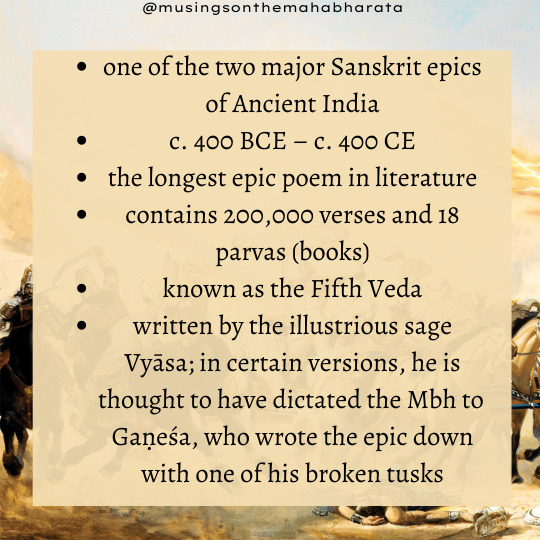

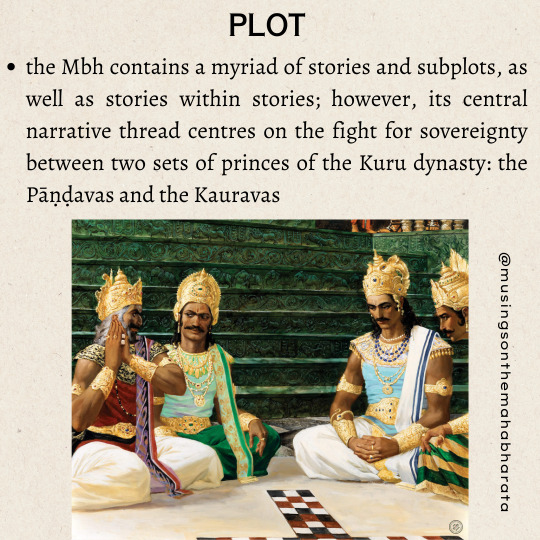
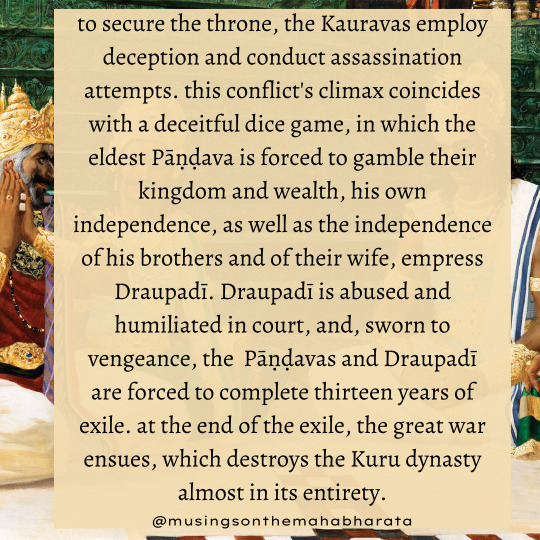
#mahabharata#mahabharat#sanskrit#veda#scholar#itihasa#phd#phd thesis#writer#female scholar#krishna#govinda#vyasa#draupadi#pandavas#mahabharatam#hindu mythology#hinduism#yudhishthir#yajnaseni#hindu#hindu art#hindu studies#religion#religious studies
17 notes
·
View notes
Text
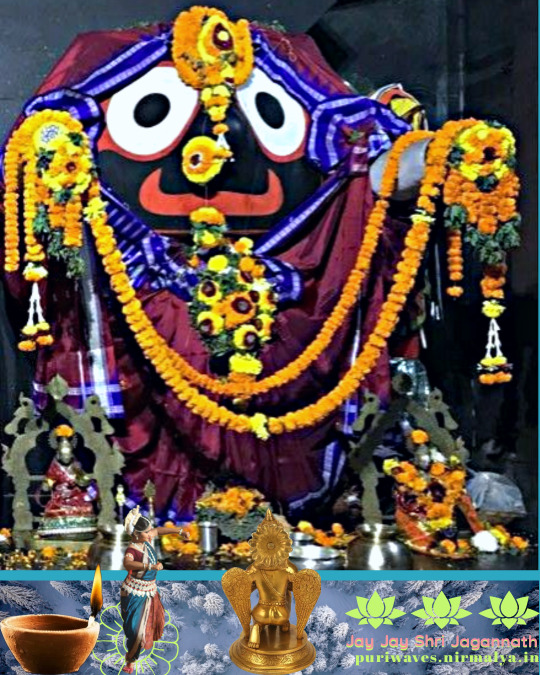
Tithi in Panchang – Hindu Calendar on Saturday, March 2 2024 – It is Krishna Paksha Saptami tithi or the seventh day during the waning or dark phase of moon in Hindu calendar and Panchang in most regions. It is Krishna Paksha Sashti tithi or the sixth day during the waning or dark phase of moon till 3:00 AM on March 2. Then onward it is Krishna Paksha Saptami tithi or the seventh day during the waning or dark phase of moon till 3:18 AM on March 3.
6 notes
·
View notes
Text
Hey (with the intention of dancing with you on the wackiest songs with craziest dance steps in 90s govinda style)

#Tujhe mirchi lagi toh main kya karu?
#desi culture#desi academia#desi tumblr#desi people#desi aesthetic#aesthetic#indian things#desi humor#desi tag#desi stuff#desi things#govinda#dance fever#bollywood
18 notes
·
View notes